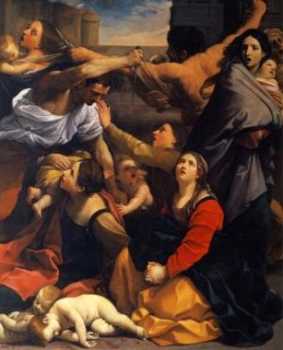(1Jn 1:5-2:2; Ps 123:2-5,7-8; Mt 2:13-18)
One of the best things about paying close attention to Scripture is the way the writers of the Holy Bible help us bridge the gap between the Old Testament and the New Testament.
Today’s Gospel from Matthew is a classic example as the author writes about the “Slaughter of the Holy Innocents” which the Church remembers today.
“A voice was heard in Ramah, sobbing and loud lamentation; Rachel weeping for her children, and she would not be consoled, since they were no more.”
Rachel, the wife of Jacob, is said to be crying over the murder of little boys by King Herod – a ruler who was so afraid of this little child Jesus, that he ordered the slaughter of innocent children in an attempt to kill him and stop him from becoming a king.
Fortunately, Joseph had been warned in a dream to flee to Egypt with Mary and Jesus, which he did.
This story has many bridges to the Old Testament.
First there is the slaughter of the babies, which recalls a similar fate of the young Hebrew boys who perished at the hands of the Pharaoh in Egypt, who feared the strength in numbers of the Hebrews. Later, in the same land, another slaughter was ordered as a new Pharaoh tried to drive those same Hebrews out of a plague-ravaged land – a curse against first born males that backfired on him.
Then there is the interesting notion of Jesus, Mary and Joseph running TOWARD Egypt for safety, as opposed to the FLEEING from Egypt by Moses and the Jews so many years prior, an event that took place the day after that first-born backfire occurred, thanks to the blood of lambs on doorposts.
Blood of the lamb. Get that connection, too?
Finally, there is the very emotional quote in today’s Gospel that comes from the Old Testament book of Jeremiah, in which Rachel weeps for her children – those slaughtered just as Jesus, Mary and Joseph are fleeing to safety.
Rachel first appears in Genesis, where she meets and eventually marries Jacob, only to tragically die while giving birth to a child; and then later in Jeremiah, the prophet, who tells us that Rachel, who had refused to be consoled after her tragic loss, was indeed to be consoled by God and given her reward for her pain.
Today’s Feast of the Holy Innocents brings together those Old Testament stories of pain and sorrow into a single tragic event.
Can you imagine the horror?
All of these families with very young boys … most of them probably had no idea about the miraculous birth or that God had become man in the flesh, right under their noses. After all, except for some shepherds and a few wise men, who else knew?
King Herod also knew just enough to be dangerous. He sent his men out into the streets in a surprise attack, killing the male babies without warning.
Both blood and tears were spilled that day – and it’s most likely that few understood why.
In the days of the Pharaoh in Egypt, the Hebrews must have felt puzzled as well when first-born males were being eliminated – especially since there were bricks to be made and cities to build. They, too, wept over spilled blood, but found ways to survive.
Fear can lead to tragic decisions by kings, by rulers, by terrorists, by genocidal governments … and by parents. Not just in history, but today – abortion, genocide, euthanasia, to name a few tragedies.
We fear over-population, so we force abortions on our people. (A policy that has backfired in China). We fear the results of a pregnancy test, so we abort. We fear those of a different race or religion, so we eliminate. We kill. We fear the pain of growing old, the cost of health care, so we make it legal to kill our parents.
Today’s headlines. Today’s blood spilling … today’s tears.
Indeed, Rachel is still weeping.
But at the same time, the birth of that little boy Jesus in Bethlehem has given us all the assurance that the Holy Innocents of Egypt … of Bethlehem … and of today do not die in vain. They become martyrs on a grand stage where the forces of evil battle the forces of good.
Here is the good news: We win in the end.
So shed your tears, fight for justice and pray for the conversion of souls.
But never lose the hope we were given with the incarnation of God, which we continue to celebrate this Christmas season.
